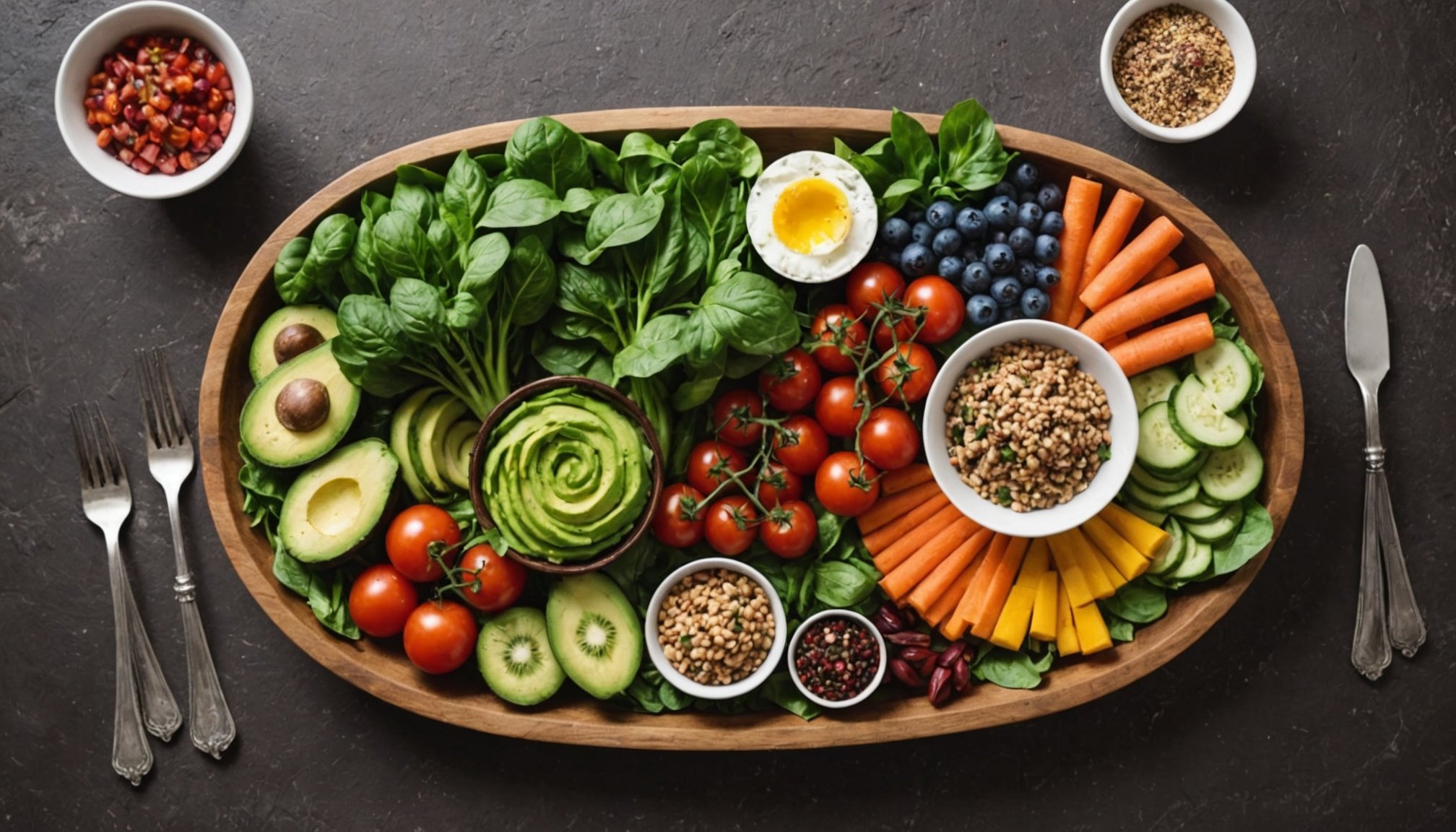Understanding Whole Foods
Whole foods play a significant role in nutrition, defined as foods that are minimally processed or refined, retaining most of their natural nutrients. These include fruits, vegetables, whole grains, nuts, seeds, and legumes. The benefits of whole foods are vast, offering essential vitamins, minerals, and fibre crucial for a balanced diet and overall wellness.
In the UK, common whole foods include staples like oats, barley, apples, carrots, and legumes such as lentils and chickpeas. These are readily available and easily incorporated into the UK’s dietary habits, supporting a shift towards healthier eating patterns. Given the increasing concerns about processed foods, whole foods have become central to discussions about improving public health and nutrition.
This might interest you : Designing a Compact and Impactful Home Fitness Routine for UK Residents with Space Constraints
Benefits of whole foods are extensive. Consuming these foods contributes to better digestion, enhanced energy levels, and a reduced risk of chronic diseases including heart disease and diabetes. Whole foods support brain health and help maintain a healthy weight due to their richness in nutrients and fibre. Emphasising whole foods in dietary choices can lead to improved long-term health outcomes. Understanding their role in a well-balanced diet can empower individuals to make informed decisions about their nutrition.
Incorporating Whole Foods into Everyday Meals
Exploring the integration of whole foods into your daily meals can transform your eating habits by introducing you to new flavours and nutritional benefits. When considering meal planning, it’s helpful to start with the basics, such as breakfast.
Also to read : Transform Your Work-from-Home Setup: Essential Tips for UK Adults to Enhance Posture and Boost Comfort
Creative Breakfast Ideas
Kickstart your day with simple and nourishing breakfast recipes that champion whole foods. Consider oatmeal with fresh berries and nuts, providing both energy and essential vitamins. Prioritising whole foods in the morning can enhance your nutrition, setting a positive tone for the rest of your day. Another option is a smoothie bowl packed with local ingredients like spinach, apples, and a dash of honey for flavour. Incorporating local produce not only heightens taste but also supports local economies.
Wholesome Lunch Options
Create balanced lunch recipes efficiently using whole foods, ensuring your meals are not only delicious but also convenient. Meal prep strategies can save time; batch-cook grains or legumes to pair with fresh veggies. By embracing seasonal ingredients, you ensure your meals remain fresh and budget-friendly.
Nutritious Dinner Inspirations
Curate dinner recipes that resonate with the UK palate by integrating whole foods creatively. Focus on diversity and plant-based options, such as roasted vegetables with quinoa or a rich lentil stew. Customising these meals allows you to cater to various tastes while maximising health benefits.
Snacking Smart with Whole Foods
Finding healthy snacks that are both satisfying and convenient can be a challenge, especially when trying to incorporate more whole foods. Whole food snacks offer a unique blend of taste and nutrition that can easily fit into any lifestyle. In the UK, identifying these options is both a delight and an adventure.
Whole food snacking is an excellent way to enjoy the nutritional benefits of unprocessed foods. Some readily available UK options include fresh fruit, such as apples and berries, which offer natural sugars and essential vitamins. Nuts and seeds are also popular choices; they provide healthy fats and proteins that are crucial for energy and satiety.
Creative preparation is key to keeping whole food snacks exciting. For instance, try topping a bowl of Greek yogurt with mixed berries and a handful of nuts for a tasty yet simple snack. Another delightful option is to pair hummus with sliced vegetables like carrots and cucumbers, offering a crunchy and flavourful experience.
It’s essential to understand the role of snacking in a balanced diet. By integrating whole food snacks into your routine, you not only satisfy hunger but also enhance your overall health, fueling your body with vital nutrients throughout the day.
Cultural Influences on Whole Food Choices
In the realm of UK cuisine, traditional dishes have long showcased the nation’s dedication to using whole foods. Classic offerings like the Sunday roast boast hearty portions of roasted meat accompanied by a medley of vegetables, embodying principles of wholesome eating. Similarly, dishes such as fish and chips, with its focus on sustainably sourced fish and potatoes, highlight an enduring preference for unprocessed ingredients.
Over the decades, the UK has witnessed an evolution in dietary habits, shifting from heavy, meat-centric meals to a diet more inclusive of plant-based ingredients. This transition reflects growing awareness of health benefits linked to whole foods, as well as environmental concerns. The rise of healthy lifestyles has seen lentils and quinoa find their place alongside age-old staples like oats and barley in everyday meals.
Moreover, the cultural diversity seen across the UK is richly reflected in local food selections. The introduction of flavorful spices from Indian, Mediterranean, and Asian cuisines has expanded the collective palate, bringing vibrant whole food dishes like chickpea curry and falafel into the mainstream. This blend of traditional and global influences continues to shape a dynamic and inclusive food culture, celebrating both heritage and innovation.
Nutritional Benefits of Whole Foods
Choosing whole foods is a powerful way to tap into numerous health benefits. These unprocessed delights are packed with essential nutrients that contribute significantly to overall well-being. Fruits, vegetables, whole grains, and nuts are just a few of the categories rich in vitamins, minerals, and antioxidants. These components play crucial roles in disease prevention. For example, the antioxidants found in berries can reduce inflammation and lower the risk of chronic diseases.
Beyond disease prevention, whole foods provide consistent energy levels throughout the day—a key advantage for people with active lifestyles. Whole grains, such as oats and brown rice, contain fibre, which aids in maintaining steady blood sugar levels, preventing the peaks and troughs in energy often linked to processed foods.
Moreover, whole foods have other benefits, including better gut health thanks to fibre, which promotes regular digestion. By opting for whole foods, you are investing not just in preventing diseases but also enhancing vitality and sustaining energy for daily activities. This nutritious approach is not just about eating but about nurturing your body with what nature intended.
Resources for Finding Whole Foods
Navigating the world of whole foods can be daunting, but focussing on local markets can ease this journey. These markets are an abundant resource for fresh, organic produce directly from local farmers. By shopping locally, one not only ensures fresher ingredients but also contributes significantly to the sustainability of the community. How does one get started with finding these local gems? A simple online search or community boards are great starting points to locate markets near you.
The benefits of investing in seasonal and locally produced foods extend beyond mere taste and nutrition. When you buy seasonal produce, you enjoy foods at their peak flavour while supporting ingredient sourcing that promotes shorter supply chains. This approach reduces the carbon footprint associated with long-haul transport of out-of-season foods, aligning well with sustainable food practices.
Community-driven food initiatives such as farmers’ markets, pop-up stalls, and cooperative grocers are fantastic ways to engage with sustainable sourcing. These platforms often allow consumers to interact directly with producers, providing transparency and fostering a deeper appreciation for the origin of one’s food. Participation in these initiatives not only champions environmental consciousness but also bolsters local economies, ensuring a cohesive and supportive food network.











